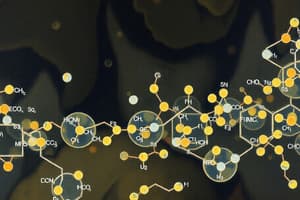Podcast
Questions and Answers
What occurs during the formation of an ionic bond?
What occurs during the formation of an ionic bond?
A transfer of valence electrons from the metal species to the non-metal species occurs.
How do elements from the periodic groups combine to form an ionic compound according to the Lewis diagram?
How do elements from the periodic groups combine to form an ionic compound according to the Lewis diagram?
Elements combine by transferring electrons to achieve a full valence shell.
Which of the following are physical properties of ionic compounds? (Select all that apply)
Which of the following are physical properties of ionic compounds? (Select all that apply)
- High melting points (correct)
- Conductivity when solid
- Brittle structure (correct)
- Soluble in water (correct)
What is the crystal lattice in ionic compounds?
What is the crystal lattice in ionic compounds?
Ionic compounds are soluble in non-polar substances.
Ionic compounds are soluble in non-polar substances.
Describe the conductivity of ionic compounds when solid and when molten or aqueous.
Describe the conductivity of ionic compounds when solid and when molten or aqueous.
What is a formula unit?
What is a formula unit?
Ionic compounds are often ____ in water.
Ionic compounds are often ____ in water.
What is ionic bonding?
What is ionic bonding?
What is the crystal lattice?
What is the crystal lattice?
Ionic crystals are soft and malleable.
Ionic crystals are soft and malleable.
Which property of ionic compounds requires a large amount of energy to overcome?
Which property of ionic compounds requires a large amount of energy to overcome?
What makes ionic compounds soluble in water?
What makes ionic compounds soluble in water?
Ionic compounds conduct electricity only when solid.
Ionic compounds conduct electricity only when solid.
What is a formula unit in the context of ionic compounds?
What is a formula unit in the context of ionic compounds?
How does the movement of electrons occur during ionic bond formation?
How does the movement of electrons occur during ionic bond formation?
What physical property causes ionic compounds to be brittle?
What physical property causes ionic compounds to be brittle?
Why do ionic compounds have low conductivity when solid?
Why do ionic compounds have low conductivity when solid?
Which chemical structure can be used to explain the bonding in Magnesium and Sulfur?
Which chemical structure can be used to explain the bonding in Magnesium and Sulfur?
Flashcards
Ionic Bonding
Ionic Bonding
The transfer of valence electrons from a metal to a nonmetal, forming ions held together by electrostatic forces.
Lewis Diagram
Lewis Diagram
A diagram showing the valence electrons of atoms in a compound.
Crystal Lattice
Crystal Lattice
A 3-D arrangement of ions in an ionic compound.
High Melting/Boiling Point (Ionic)
High Melting/Boiling Point (Ionic)
Signup and view all the flashcards
Ionic Compound Solubility
Ionic Compound Solubility
Signup and view all the flashcards
Conductivity (Solid Ionic)
Conductivity (Solid Ionic)
Signup and view all the flashcards
Conductivity (Molten/Aqueous Ionic)
Conductivity (Molten/Aqueous Ionic)
Signup and view all the flashcards
Formula Unit
Formula Unit
Signup and view all the flashcards
Monoatomic Ion
Monoatomic Ion
Signup and view all the flashcards
Polyatomic Ion
Polyatomic Ion
Signup and view all the flashcards
Ionic Bonding
Ionic Bonding
Signup and view all the flashcards
Lewis Diagram
Lewis Diagram
Signup and view all the flashcards
Crystal Lattice
Crystal Lattice
Signup and view all the flashcards
Ionic Compound Hardness
Ionic Compound Hardness
Signup and view all the flashcards
High Melting/Boiling Point (Ionic)
High Melting/Boiling Point (Ionic)
Signup and view all the flashcards
Ionic Solubility
Ionic Solubility
Signup and view all the flashcards
Solid Ionic Conductivity
Solid Ionic Conductivity
Signup and view all the flashcards
Molten/Aqueous Ionic Conductivity
Molten/Aqueous Ionic Conductivity
Signup and view all the flashcards
Formula Unit
Formula Unit
Signup and view all the flashcards
Solubility in Water (Ionic)
Solubility in Water (Ionic)
Signup and view all the flashcards
Study Notes
Ionic Compound Names and Formulas
- Ionic bonds form when electrons transfer from a metal to a nonmetal.
- Lewis diagrams (electron-dot structures) show how elements combine.
- Ionic compounds have high melting and boiling points.
- Ionic compounds are hard, rigid, and brittle.
- Ionic compounds conduct electricity when molten or dissolved in water (aqueous solutions).
- Many ionic compounds are soluble in water.
- A crystal lattice is the three-dimensional geometric arrangement of particles in an ionic compound.
- Each positive ion is surrounded by negative ions, and each negative ion is surrounded by positive ions.
Formula Units
- A formula unit is the simplest ratio of ions in an ionic compound.
- The formula unit of magnesium chloride (MgCl₂) reflects the 1:2 ratio of magnesium and chloride ions.
- In sodium chloride (NaCl), the ratio of sodium to chloride ions is 1:1.
Polyatomic Ions
- Polyatomic ions are ions composed of more than one atom.
- Common polyatomic ions include ammonium, nitrate, sulfate, and phosphate.
Naming Ionic Compounds (without polyatomic ions)
- Name the cation (positive ion) first, then the anion (negative ion).
- For monatomic cations, use the element name.
- For monatomic anions, use the root of the element name plus the suffix "-ide."
- Examples: Potassium oxide, sodium chloride, magnesium bromide.
Naming Ionic Compounds (with polyatomic ions)
- Use the name of the polyatomic ion instead of the anion.
- Examples: Sodium nitrate (NaNO₃), ammonium hydroxide (NH₄OH).
- Examples: ammonium sulfide ((NH₄)₂S), potassium nitrate (KNO₃),
Chemical Formula for Ionic Compounds
- Cations are written before anions.
- Cross multiply the charges to write the formula.
- Divide any common factors to get the simplest formula.
- Example: Magnesium oxide (MgO), Sodium nitrate (NaNO₃)
Studying That Suits You
Use AI to generate personalized quizzes and flashcards to suit your learning preferences.





